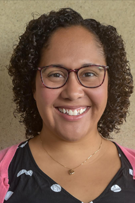HAMPTON CITY SCHOOLS EVERY CHILD, EVERY DAY, WHATEVER IT TAKES!
LANGUAGE ARTS
.jpeg)
Shari Drake
757-727-2485
K-5 ELA Curriculum Leader
Traci Judd
727-2415
Interim Secondary ELA Curriculum Leader
Kim Hatfield
Administrative Support Specialist
Language Arts/Social Studies
757-727-2105

The mission of the Hampton City Schools Language Arts Department is to provide instruction consisting of research-based practices that will allow every child to grow in their reading, writing, listening, and speaking skills.
Elementary language arts instruction focuses on the five pillars of reading: phonics, phonemic awareness, fluency, vocabulary, and comprehension. Writing instruction begins with sentence formation, progresses to paragraph formation, and advances to essay writing. Grammar lessons are included in writing instruction.
Middle and high school ELA instruction emphasizes nonfiction, including informational and functional texts, and fiction, including poetry, drama, and other subgenres. In writing, the emphasis is on developing a variety of genres, such as expository, persuasive, narrative, analytical, and research, while also connecting reading and writing through a structured writing process which includes the study of grammar. Our goal is that every HCS student will leave Hampton City Schools with meaningful literacy experiences that prepare them for the world ahead of them.
Literacy Pro Family Letter (PreK-8) | Literacy Pro Family Tip Sheet | How to Access Literacy Pro: A Visual Guide
Virginia Department of Education | Standards of Learning
727-2487
Middle School Teacher Specialist

Jennifer Butler
727-2489
Secondary School Teacher Specialist

Shally Ackerman-Arms
Teacher Specialist
The ELA instructional block includes all literacy components and is divided into whole group reading, whole group writing, and differentiated small group instruction.
A model is provided indicating the breakdown of minutes for each grade level:
Kindergarten: 170 minutes (2 hours, 50 minutes)
First Grade: 170 minutes (2 hours, 50 minutes)
Second Grade: 175 minutes (2 hours, 55 minutes)
Third Grade: 175 minutes (2 hours, 55 minutes)
Fourth Grade: 160 minutes (2 hours, 40 minutes)
Fifth Grade: 160 minutes (2 hours, 40 minutes)
 High School Summer Reading Letter
High School Summer Reading Letter
English 6: This course of study includes fiction, nonfiction, and informational texts from multiple genres. There are four strands of instruction: Communication and media literacy; reading; writing; and research. In each unit, students read, write, think critically, and respond both orally and in writing. Writing at this level focuses on the process of writing a multiparagraph essay and responding to reading in written form. Students write expository, descriptive, and narrative essays. The curriculum has been aligned with the 2017 Virginia Standards of Learning. Students will take the Grade 6 Reading SOL test.
English 7: This course of study includes short stories, poems, novels, nonfiction, and informational texts. There are four strands of instruction: Communication and media literacy; reading; writing; and research. Students will read, write, and think critically. Writing at this level focuses on narrative and expository essays and responding to reading in written form. The curriculum has been aligned with the 2017 Virginia Standards of Learning. Students will take the Grade 7 Reading SOL test.
English 8: This course includes the elements of fiction, narrative nonfiction, literary criticism, nonfiction, poetry, and drama. There is both a literary and informational focus. Additionally there are four strands of instruction including: Communication and media literacy; reading; writing; and research. Students will continue to strengthen their skills in reading, writing, listening, and speaking. Writing at this level focuses on narrative, expository, and persuasive writing and responding to reading in written form. The curriculum has been aligned with the 2017 Virginia Standards of Learning. Students will take the Grade 8 Reading and Writing SOL tests.
Reading, Writing Exploratoration (RWE)
Tier 2 Reading Intervention
Open to students in grades 6-8
Use surrounding words to determine the meaning of unfamiliar words.
Expand vocabulary by reading a variety of texts (poetry, drama, fiction, nonfiction, etc.)
Use reading strategies to monitor comprehension (ask questions, summarize, make inferences, determine text importance, visualize, and make connections).
Analyze unfamiliar words by breaking the word apart and identifying the roots and/or affixes.
Writing instruction aligned to tier 1 ELA curriculum to provide additional support for skill mastery.
READ 180
• 1 year class (1 credit)
• Tier 2 Reading Intervention
• Focuses on vocabulary and reading comprehension strategies
• Open to students in grades 9-12
• May be taken more than one time
• Includes whole group instruction, small group instruction, computer-based practice, and independent reading
High School Course Descriptions
Required to Graduate:
4 standard credits and 2 verified credits in English
SOL End-of-Course tests:
Writing (1 verified credit) - grade 10 & Reading (1 verified credit) - grade 11
English 9, 10, 11, 12 (levels 2 and 3 honors offered for each grade level)
Make and deliver multimodal presentations
Participate in and evaluate participation in group activities
Evaluate persuasive techniques used in media messages
Increase vocabulary and analyze language choices
Analyze author’s choices in fictional texts
Comprehend and analyze nonfiction texts
Write effectively in a variety of forms (expository, persuasive/argumentative), reflective, and analytic)
Apply rules for correct grammar and mechanics
Create research products that correctly reference credible sources
Use technology ethically
Create and maintain a Digital Writing Portfolio (created in English 9); Add writing samples to the portfolio continuously through 12th grade
English 10 literature focus: multicultural
English 11 literature focus: American
English 12 literature focus: British
English 12 Senior Capstone Project: During the 12th grade year, students reflect on the question “What impact do I want to make?” in regard to their chosen Academy or future career field. Students identify an industry problem and propose a possible solution. The project has five phases:
Phase 1: Generating Ideas: With the help of English teachers and Academy coaches, students will define “capstone” and explore an industry of interest and the potential impacts they could make in that field.
Phase 2: Research: Students will use credible sources to determine the possible problems associated with their Academy and/or career field.
Phase 3: Development/Implementation: Teachers will provide multiple learning frames to guide the development and implementation of the Capstone project. Each learning frame produces a different kind of project. For example, the “case study” learning frame guides students through a deep analysis of the industry problem and prompts students to determine recommended next steps. The “advocacy/awareness” campaign prompts students to create a media product that informs the audience of the problem and urges them to take action. The “service learning” learning frame guides students through creating a community service solution to a noticeable problem.
Phase 4: Reflection: This stage of the project asks students to reflect on the process, honestly evaluate their work, and propose revisions.
Phase 5: Demonstration: Students will create and deliver a multimodal presentation that includes their problem, research, learning frame, and reflection.
AP English 11 Language and Composition
Comparable to an introductory college-level rhetoric course
Development of analytic and argumentative essay writing (including incorporating research effectively)
Development of personal style
Analysis of rhetorical elements in nonfiction
AP English 12 Literature and Composition
Comparable to an introductory college-level literary analysis course
Critical analysis of writer’s purpose and stylistic choices
Writing assignments include expository, analytic, and argumentative
Consult your school’s guidance department to learn more about Dual Enrollment options available.
JOURNALISM I, II and III
• Focus on writing skills and print media in the 20th century
• Write news stories, features, sport stories, and editorials for publication in the school newspaper
• Develop skills in newspaper style, news reports, feature articles, sports stories, editorials, captions, and editing/proof symbols
• Develop production/graphics skills in design, paste-up, advertising, circulation, photo cropping and sizing, and design elements
• Explore legal restraints on free speech that affect high school publications as well as metropolitan dailies
• Develop a newspaper vocabulary
CREATIVE WRITING
• For students interested in writing poetry and prose
• Develop expression of feelings and ideas
• Students should have good language skills
ADVANCED CREATIVE WRITING
Prerequisite: Creative Writing or Teacher Recommendation
• Built on skills students have learned in Creative Writing
• Production of school literary magazine
TECHNICAL DRAMA
• 1 semester class (1/2 credit)
• Non performance class
• Basics of set construction and design, lighting, and costume makeup
• Practical experience which supplements classroom theory
ACTING I
• 1 semester class (1/2 credit)
• Performance class
• Trains beginning dramatic students in use of voice and body in stage projection
ACTING II/DIRECTING
Prerequisite: Acting I and Technical Drama
• Act in and direct several one-act plays
• Open to juniors and seniors who have successfully completed Acting I and Technical Drama
SAT/ACT PREP
Prerequisites: Algebra I, Geometry, and a college-bound course of study
• Classes meet every other day for 90 minutes (1/2 elective credit)
• 1 Semester Course: Half Math/Half Verbal & Writing
• Students may elect to receive a pass/fail grade or letter grade
• Uses SAT Software & SAT Practice Tests